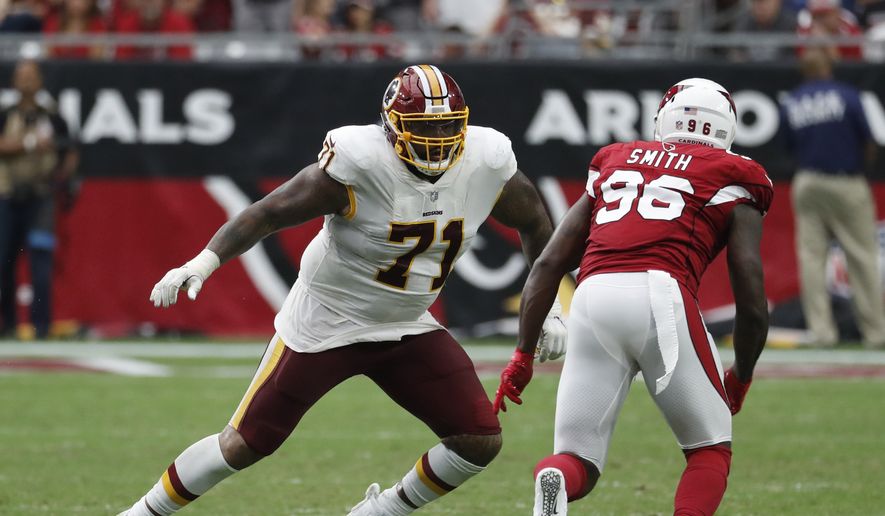In “The Godfather,” after an emotional discussion on possibly gunning down a rival gangster and dirty cop, Michael Corleone utters a classic line: “It’s not personal. It’s strictly business.”
That might be Trent Williams’ favorite part of the movie.
The Washington left tackle has spent his entire nine-year career in D.C. No current player has a longer tenure. He has established himself among the NFL’s elite at his position. “He’s the best tackle in pro football,” coach Jay Gruden said Tuesday. “He’s a great player for us, a great leader.”
If president Bruce Allen and senior vice president of football operations Eric Schaffer winced a bit upon hearing such laudation, it’s understandable. Williams doesn’t need any more leverage as he skips mandatory minicamp in hopes of a new contract.
The seven-time Pro Bowler already has the team by its proverbial short hairs.
Washington is tissue-thin at tackle, where matador pass protection could lead the quarterbacks to encase themselves in bubble wrap. Early impressions of veteran Ereck Flowers, one of Williams’ potential replacements, highlights the drop-off ahead if nothing changes before the regular season begins.
According to Gruden, players and coaches understand that the business side of Williams’ decision is separate from the personal side, where bonds are formed through activities, practices and games. “I know his teammates support him and we support him without a doubt,” Gruden said. “But hopefully we’ll get it situated where he comes back.”
Missing a mandatory minicamp in which he wasn’t scheduled to participate — due to an offseason procedure that removed a growth from his head — is no big deal. But the team medical staff and how it handled the issue apparently are factors in Williams’ absence, perhaps to the point of causing an irreparable breach.
If he misses actual games, not just a portion of training camp, his commitment to the franchise that has paid him an estimated $95 million has to be questioned.
It’s easy for someone to say “don’t take it personally” as they do something that tremendously affects you personally. Likewise, it’s difficult for you, the aggrieved party, to completely ignore your feelings just because the situation could’ve happened to someone else.
Football players are more likely to experience feelings of betrayal, conscious or not, when one of their brethren voluntarily removes himself for reasons other than injury. Basketball and baseball players aren’t out there “going to war” against an opponent, with the threat of broken bones and scrambled minds prevalent on every play. Being present for your teammates could be the difference between them walking off the field or being carted off.
The sport’s violence binds players and promotes self-sacrifice. But it’s also a reminder to look out for themselves, because the league certainly doesn’t.
Washington has been more than fair to Williams. It stood by him not through one, but two drug suspensions. It signed him to a $66 million contract extension in 2015, making him the NFL’s highest paid lineman at the time. He still ranks among the league’s top 10 earners at his position, one month before his 31st birthday.
But he’s reaching the point in his career where Washington has to consider parting ways. His durability has been a concern. If he’s hellbent on obtaining a new contact with fat guarantees through his early 30s — when his availability and ability are expected to decline — or if he’s convinced that Washington’s medical treatment is unacceptable, then he should be elsewhere.
Naturally, Williams would like to cash in one more time. That’s not how franchises in Washington’s position usually think. Banking on emotional attachment, they prefer an established veteran to sign for lower pay or accept a restructured deal that provides salary cap relief. They want him to “take one for the team.”
If not, he’s often taken out back and released, deemed a cap casualty.
We’re not yet at the point where Washington should put Williams on the market. There’s plenty of time between now and Week 1 to work out a financial agreement that both parties can accept. Or to assuage Williams’ fears about the team’s doctors and trainers.
But that assumes Williams’ ultimate goal isn’t a change of scenery. This shouldn’t be a difficult concept to comprehend, but it’s possible that Williams really just wants out.
Maybe he doesn’t want to finish his career in burgundy and gold. Maybe he wants to experience life in another organization with a different culture. Maybe he longs for a place where the winning is more common, and the dysfunction is less obvious.
That would be the ultimate “business, not personal” declaration.
And you really couldn’t blame him.
⦁ Deron Snyder writes his award-winning column for The Washington Times on Tuesdays and Thursdays. Follow him on Twitter @DeronSnyder.
• Deron Snyder can be reached at deronsnyder@gmail.com.




Please read our comment policy before commenting.